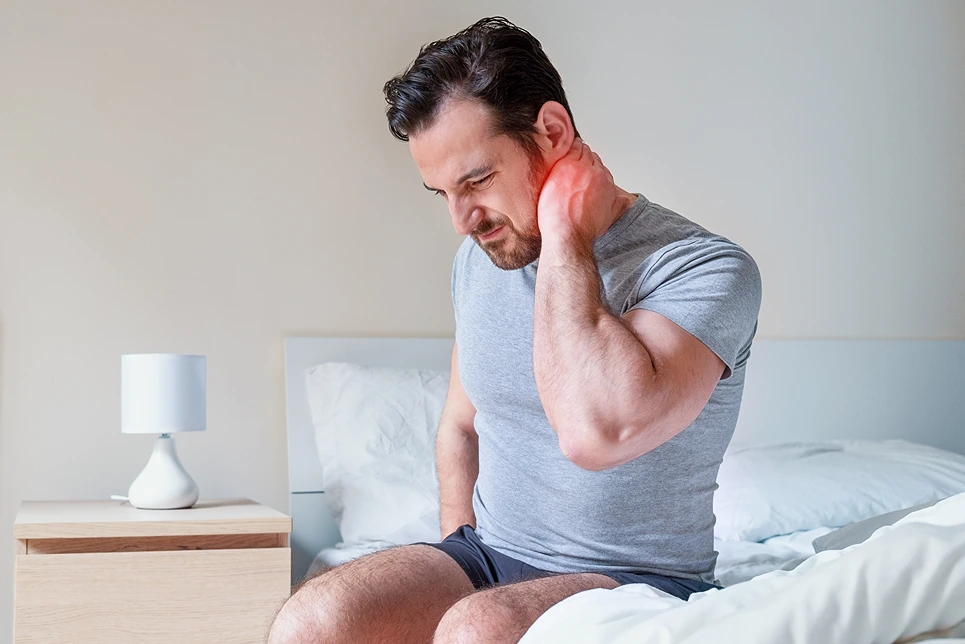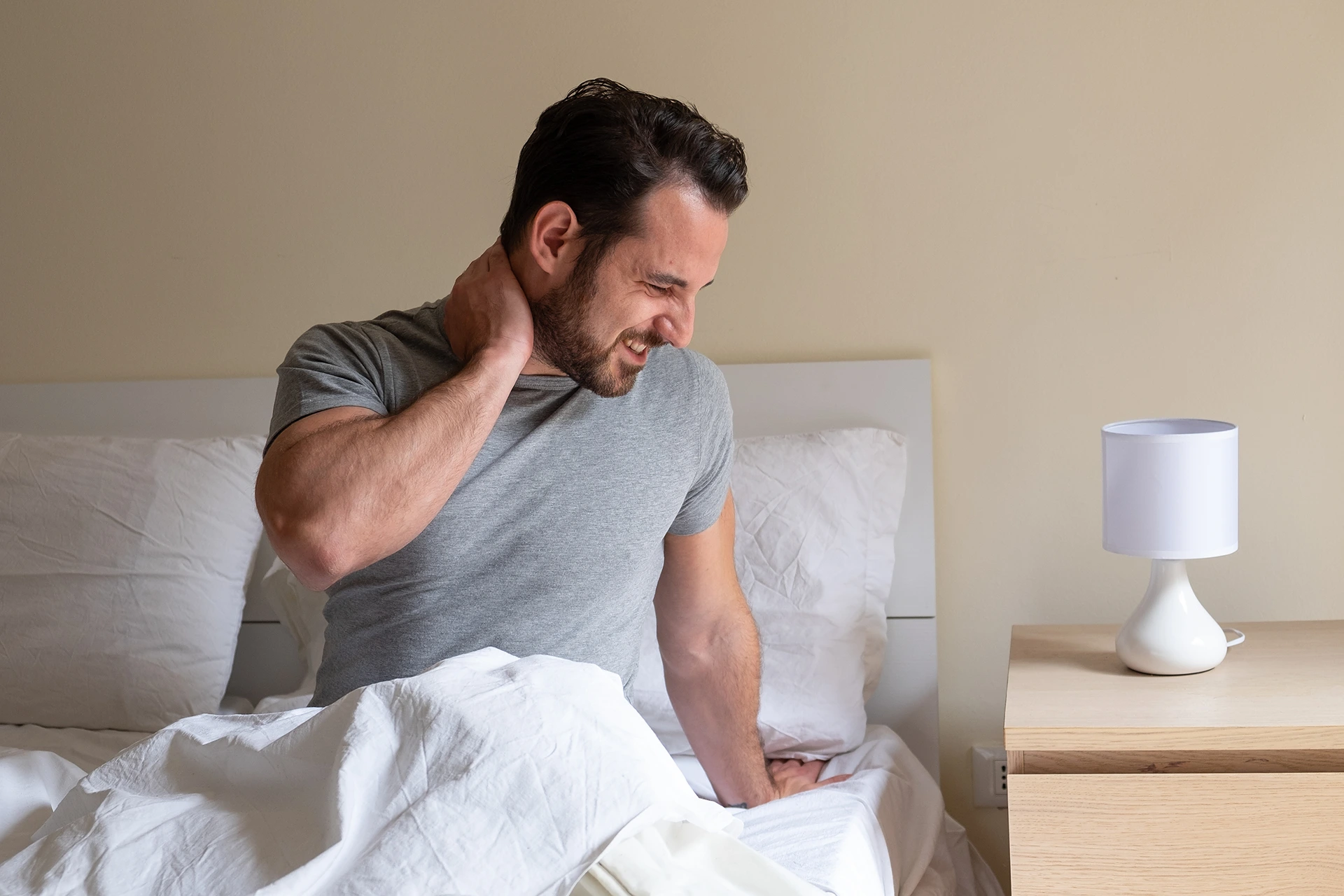You’re not the only one who frequently wakes up with neck pain and stiffness after a good night’s sleep.
Many people suffer from cervical discomfort caused by awkward sleeping positions, unsupportive pillows, or medical conditions affecting the neck.
The Causes Behind Neck Pain While Sleeping
Neck pain from sleeping often results from compromised positioning of the head and spine during rest.
Our heads weigh around 10-12 pounds on average – quite a heavy load for the cervical vertebrae to support for hours in vulnerable positions.
While we slumber, our muscles fully relax and cannot hold the neck in proper alignment. This places strain on the surrounding joints, nerves, and soft tissues.
Misalignment during sleep can trigger inflammation, muscle tightness, pinched nerves, and head and neck aches.
Specific sleeping positions frequently create neck problems
Stomach Sleeping Twists the Neck
Do you sleep face down on your stomach? This twists the neck sideways for hours, overextending the muscles on one side while overstretching those on the other.
Sleeping prone with the neck rotated and bent can lead to painful muscle spasms and joint stiffness.
Back Sleeping Overarches the Neck
Lying on the back can cause the head to arch backwards, overextending the neck. This hyperextension narrows the airways, increasing the chances of snoring and sleep apnea. It also compresses the facet joints in the cervical vertebrae, which can lead to chronic neck pain.
Side Sleeping Strains the Neck
Side sleepers often rest the head on a high pillow, angling the neck upwards. This improper head and neck alignment strains the cervical spine’s natural curve. The upward tilt also compresses nerves and blood vessels, further irritating the neck.
How to Determine the Best Sleeping Position for Your Neck
Finding the optimal sleeping position is crucial to prevent neck pain, as proper spinal alignment varies for different postures. Consider your natural sleeping pose and make small adjustments:
For Back Sleepers:
- Align your neck with the rest of the spine.
- Avoid hyperextending the neck by keeping the chin tucked and head straight.
For Side Sleepers:
- Keep your neck straight and head level.
- Make sure your neck is not angled up or down on the pillow.
For Stomach Sleepers:
- Consider a flatter sleeping surface like a firm mattress if needed to keep the neck neutral.
No matter your favored position, keep the neck supported in a neutral posture without overarching or craning it. This takes pressure off the cervical spine to minimize pain.
Choosing the Best Pillows to Prevent Neck Aches

An improper pillow contributes significantly to neck pain. The right fill material and pillow height can make all the difference.
Cervical Pillows Support the Neck
For neck pain sufferers, contoured therapeutic pillows and cervical pillows provide an indented area for the head to rest while elevating and supporting the neck. This alignment helps keep the cervical spine in a neutral position.
Memory Foam Pillows Contour to the Neck
Memory foam molds to the shape of the head and neck. This customizable cushioning comfort allows side, back, and stomach sleepers to maintain proper spinal alignment.
Adjust Pillow Height Based on Sleeping Position
The proper pillow loft and thickness will vary based on your go-to sleeping posture:
- Back sleepers – Thinner pillows work best, around 3 to 4 inches high.
- Side sleepers – Use a thicker pillow around 4 to 6 inches in height to keep the neck aligned.
- Stomach sleepers – Opt for a very slim pillow or none at all to prevent neck strain.
Simple Exercises to Relieve Neck Pain from Sleeping
If you wake up with a stiff, sore neck, gentle motions can get those muscles moving again before getting out of bed. Avoid sudden, sharp movements, and stop any exercise that increases pain. Slow ranges of motion and gentle exercises can relax tight neck muscles:
- Slowly rotate the neck from side to side.
- Carefully tilt the head forwards, towards the chest, then backwards.
- Gently bring the chin in towards the neck, creating a double chin.
- Tilt the head sideways towards each shoulder.
- Rotate the neck in a circle clockwise then counterclockwise.
- Gently flex the neck to move the ear towards each shoulder.
When to Seek Medical Care for Neck Pain
While sleeping adjustments, pillow choices, and exercises can alleviate many minor neck problems, certain symptoms require prompt medical attention:
- Severe pain that does not improve with self-care after 1 week.
- Numbness, tingling, or weakness radiating into the shoulders, arms or hands.
- Headaches, dizziness, difficulty moving the neck, loss of coordination, or loss of bowel/bladder function.
These signs may indicate nerve damage or serious spinal conditions requiring imaging tests and specialist referral. Seek emergency care immediately for traumatic neck injuries after accidents.
Medical Treatments for Neck Pain Caused by Sleeping
For persistent pain or diagnosed cervical conditions, doctors can provide specialized treatments. A few examples of which are detailed in the table below:
| Treatment | Description |
| Pain Medications | Over-the-counter NSAIDs or prescription muscle relaxants and narcotic pain relievers. |
| Spinal Injections | Steroid injections into inflamed muscles and joints or nerve root blocks to reduce neck and arm pain. |
| Physical Therapy | Exercises to improve flexibility, strength, and range of motion. Therapists also provide manual mobilization techniques. |
| Posture Correction | Strategies and braces to improve neck positioning when sitting or moving. |
| Surgery | Cervical fusion or artificial disc replacement to treat damaged vertebrae, herniated discs, or narrowing spinal canals. |
Wake Up Feeling Better with Proper Sleep Habits

Neck pain often arises due to compromised sleeping postures and pillow positioning misaligning the cervical vertebrae.
Analyze your normal sleeping pose and make adjustments – small changes can prevent neck problems from developing or worsening. Invest in a high quality, ergonomically designed pillow and other kinds of supportive pillows that suits your sleeping style.
While most cases of neck stiffness and soreness stem from minor misalignments that resolve quickly, severe or persistent pain requires medical investigation. By understanding the root causes of neck aches during sleep and taking proactive steps to improve posture, you can rest easy and wake up energized, mobile, and pain-free.
If the problem persists, be sure to continue your search for relief on Kaly. Their extensive database allows you to find skilled specialists in your area that are equipped to provide advanced diagnosis and treatment options for ongoing neck discomfort.
